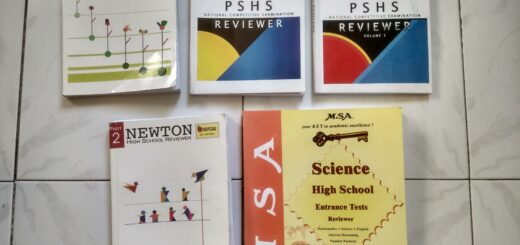Self-study vs review center for college entrance test review: Advantages and disadvantages
Disclosure: This post may contain affiliate links. When you buy through links on my site, I may earn a small commission. Thank you for your support.


Whether you’re preparing for a science high school admission test, a college entrance test, or the board examination, you’re bound to be confronted with a major dilemma: do you self-study or enroll in a review center?
Successful passers come from both self-study and review center groups, so one method is not objectively better than the other. Each has its set of advantages and disadvantages, which are discussed below:


Self-studying for a college entrance test
Advantages
Study at your own pace — You can breeze through the topics that you already know by heart, or devote more time to more complicated concepts. You call the shots as to how fast or slow you wish to proceed.
Study anytime, anywhere — Do you like to study first thing in the morning when your mind is fresh? Or do you retain more information at night when all your other tasks are done? Do you like studying with music on, in your bedroom, or in a coffeeshop where there’s fast Wi-Fi? It’s your call.
Save money — There are no review center fees to pay. You can buy second-hand review materials, instead of purchasing new. You can even get the review materials free if you know where to look.
Save time — Who wants to waste time traveling between your home and the review center? That time could be better spent on extra-curriculars or a much-need rest.
No pressure from comparing yourself with others — If you’re an introvert or simply do your best work solo, then self-studying is for you. There’s no pressure to socialize or join study groups. In a review center, you get to know which ones are the “mamaws” (over-achievers/exceptionally bright), which might sow the seeds of anxiety or self-doubt in you.


Disadvantages
Lack of structure – Where do you even start? Do you study all of math first and then other subjects next, or do you cover a little of each subject every day? Are you sure you’re not missing anything? The amount of material you need to cover might overwhelm you. In fact, there are learners who buy and download tons of review books but never get around to using them.
No feedback — How do you know if you’re studying enough? What if you need someone to clarify a concept or solution to you? Without someone giving you feedback, you’re on your own.
Distractions everywhere — When there’s no one watching you, it’s tempting to procrastinate or get distracted by your gadgets. “I’ll check my Facebook feed for just one minute” can quickly escalate into hours of watching YouTube gameplay videos.


Studying with the help of a review center
Advantages
Structure — A structure to a review is like a course syllabus to a subject. There’s a clear path to the review process, with revision and assessment methodically implemented along the way. In a review center, you reap the benefits of a time-tested method of reviewing. The review covers everything you need to know plus a little more.
Instruction and guidance from qualified teachers — Review center instructors were exam top-notchers themselves (in fact, it’s a job requirement in most, if not all, review centers). If the exams were sports, it’s like having an ex-champion as your coach. Instructors are competent, and they take it as a personal mission to help you succeed.
Up-to-date and relevant review materials — Review materials produced by the centers themselves take into account any changes in the most recent examinations, so they’re kept up-to-date. The topics covered are based on the actual competencies tested in the real exams.
Learn test-taking skills — Aside from teaching you the relevant material, review center instructors also provide test-taking tips, like how to manage the allotted time to answer all questions satisfactorily, eliminate the wrong options when all options look plausible, which formula to use when certain variables are given, etc.
Feedback — Pre-tests are given at the start to help you know your strengths and weaknesses, as well as figure out which particular topics to devote more time to.
Motivation from reviewing with peers — When you see fellow review center students working hard, you’re likely to work hard, too. You can even form study groups to supplement your review center instruction.


Disadvantages
Cost — Review center fees can cost up to P10,000 for college entrance test preparation. In addition, you might have to shell out extra for the review materials. If you don’t succeed in the exam, you’re likely to see this cost as money down the drain. This might be the wrong way to look at it, but it is what it is.
Travel time and scheduling conflicts — If you’re taking transport, you suffer the double whammy of chasing after transport and sitting for hours in traffic when traveling between your home and the review center. And although there is a choice of review schedules, they might conflict with your existing commitments.
In a nutshell, self-study is ideal for highly motivated learners who are able to stay focused and study on their own consistently. Those who struggle with self-learning may benefit from the structure and guidance provided by review centers. Still, both types of learners can gain from either one or the other.


Ultimately, your fate rests in your own hands. The review materials won’t read themselves nor will the math problems solve themselves.







